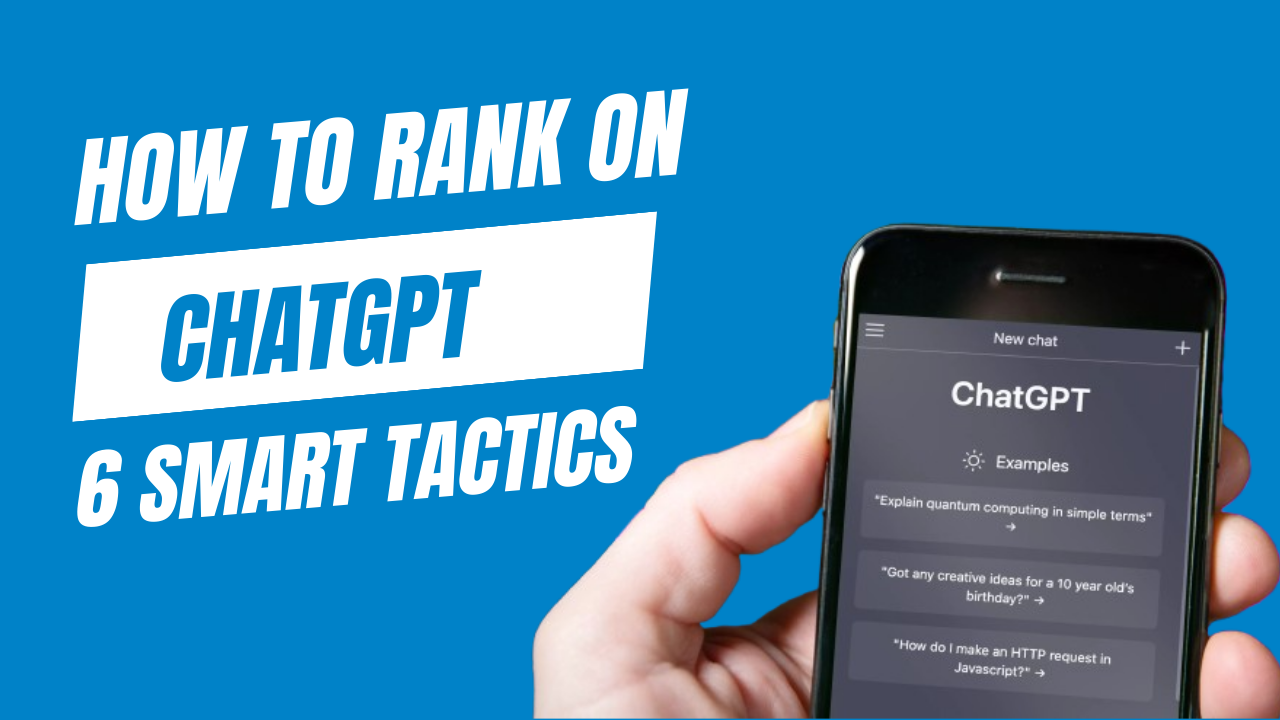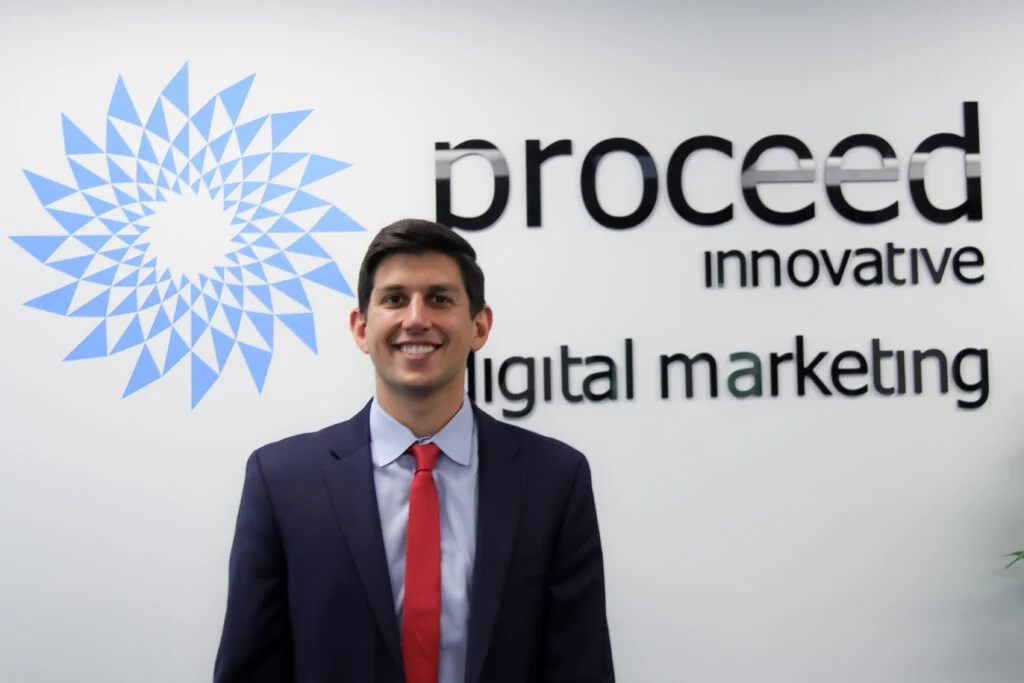In today’s digital landscape, search engines are no longer the only way people discover businesses online. Conversational AI tools like ChatGPT are quickly becoming go-to sources for answers, recommendations, and insights. If you want your website to stay visible and competitive, it’s not just about ranking on Google anymore, it’s also about being referenced and recommended by AI platforms. If your website isn’t showing up in AI-powered conversations, you could be missing out on a whole new stream of traffic and customers.
In this blog, we’ll explore six practical strategies you can use to increase your website’s chances of being recognized by ChatGPT. From strengthening your content authority to building trust signals that AI models rely on, these methods will help position your site as a credible, valuable resource in the age of AI-driven search.
Why ranking your website on ChatGPT matters
You already know the importance of ranking on Google, but here’s the thing: people aren’t just searching anymore, they’re asking. Tools like ChatGPT are becoming digital assistants, helping users find recommendations, compare options, and get advice in a conversational way. If your website shows up in those answers, you’ve just unlocked a brand-new way to reach potential customers.
Here’s why it matters:
- AI is the new search bar: More people are using ChatGPT to ask questions instead of typing them into Google. ChatGPT averages 4.61 billion monthly visits with 800 million weekly active users, and the site processes more than 1 billion queries per day. If your site is part of the answer, you’re in front of that audience instantly.
- Trust by association: When ChatGPT references your business, it’s like a virtual “stamp of approval.” Users see your site as credible and worth checking out.
- Less competition: Search engines list pages of results. ChatGPT usually gives just a handful of suggestions, meaning if you’re included, you stand out more.
- Early advantage: AI search is still new. Positioning your site now means you’re ahead of the curve while others are still figuring it out.
In short: ranking on ChatGPT isn’t just about traffic, it’s about visibility, credibility, and staying competitive as the way people search continues to evolve.
How does ChatGPT rank websites?
Unlike Google, ChatGPT doesn’t crawl the web in real time or display a list of search results. Instead, it’s trained on a massive amount of data from websites, books, and other sources to generate answers. So, when someone asks a question, it doesn’t just “search” the internet, it predicts the most helpful and relevant information based on patterns it has learned.
Ranking on ChatGPT is a bit different from traditional SEO. The following are the main factors that determine what information is provided by ChatGPT:
- Brand mentions: ChatGPT is more likely to recommend your brand, services, and products the more they are mentioned around the web.
- Reviews: Getting positive customer reviews on your website as well as websites such as Amazon, Google, and BBB can increase the likelihood of being recommended by ChatGPT.
- Relevancy: The web pages for products and services mentioned by ChatGPT tend to have the same keywords that are used in the prompt from the user.
- Age: Businesses that have been around longer are more likely to be mentioned than newer businesses.
- Recommendations: If your business, products, or services are recommended by other websites, you are more likely to be recommended by ChatGPT as these websites seem to influence its recommendations.
- Authority: Businesses that have established domain authority, have large social followings, and are mentioned across websites are more likely to be recommended by ChatGPT.
When creating content for your website, focus on the following to ensure that information from your website appears in ChatGPT answers:
- Authority matters: ChatGPT tends to rely on sources it recognizes as trustworthy and credible. High-quality, well-cited content from reputable websites is more likely to be referenced.
- Clear, structured content helps: Organized, concise information makes it easier for AI to understand and use your content in answers. Think headings, bullet points, and straightforward explanations.
- Topical relevance: If your site consistently covers a topic in depth, ChatGPT is more likely to “know” that your website is a reliable resource for that subject.
- Freshness counts: Updated content shows that your information is current, which can increase the chances of being referenced in AI-generated answers.
Chatgpt.com website traffic by country
| Country | All devices | Desktop | Mobile |
|---|---|---|---|
| 🇺🇸 United States (17.14%) | 899.17M | 80.31% | 19.69% |
| 🇮🇳 India (8.61%) | 451.54M | 70.09% | 29.91% |
| 🇧🇷 Brazil (5.49%) | 287.94M | 75.29% | 24.71% |
| 🇩🇪 Germany (4.43%) | 232.34M | 81.91% | 18.09% |
| 🇬🇧 United Kingdom (2.97%) | 155.84M | 78.17% | 21.83% |
6 Ways to Rank Your Website on ChatGPT
Ranking your website on ChatGPT might seem tricky at first, but there are practical steps you can take to boost your chances. From creating clear, authoritative content to keeping your information fresh, these six strategies will help position your site so AI tools can recognize and
1. Create high-quality content
When it comes to ranking in ChatGPT, quality really does matter. The AI isn’t just pulling random websites, it’s looking for content that’s clear, accurate, and trustworthy. By creating high-quality content, you’re giving ChatGPT the kind of material it wants to reference.
High-quality content usually has a few key traits:
- Accuracy and credibility: Well-researched information with facts, data, or expert insights makes your site more reliable.
- Depth and detail: In-depth articles that cover a topic thoroughly are more likely to be recognized as authoritative.
- Clarity and readability: Content that’s easy to read, with organized headings and concise explanations, helps AI better understand your content and pull the right information.
- Value for your audience: Content that actually answers questions, solves problems, or provides actionable advice is what users and ChatGPT find useful.
Simply put, the better your content, the more likely ChatGPT will consider it a trustworthy source to reference in its responses. Investing in high-quality content doesn’t just help with traditional SEO, it also positions your website to be part of the AI-driven search landscape.
Structure your content clearly
Even the best content can get overlooked if it’s hard to follow. ChatGPT is more likely to reference content that’s well-organized and easy to understand. Structuring your content clearly helps the AI “read” it and pull the right information for answers.
Here’s how to make your content AI-friendly:
- Use headings and subheadings: Break your content into sections with descriptive titles so both readers and AI can navigate it easily.
- Bullet points and lists: Presenting key information in lists makes it scannable and digestible.
- Short paragraphs: Keep paragraphs concise to improve readability and comprehension.
- Highlight important information: Use formatting like bold text for key points to make them stand out.
By organizing your content in a clear, logical way, you’re not just helping AI understand it, you’re also creating a better experience for your human readers. Clear, structured content increases your chances of being referenced and keeps visitors engaged once they land on your site.
Answer specific questions
One of the best ways to get noticed by ChatGPT is to create content that directly answers the questions people are asking. Think about the queries your audience might type or say into an AI chatbot, and make sure your content provides clear, helpful answers.
The following are tips for targeting questions effectively:
- Use question-based headings: Titles like “How to Fix [Problem]” or “What Is [Topic]?” signal that your content answers a specific query.
- Be concise and clear: Give straightforward answers before diving into additional details or examples.
- Include related questions: Anticipate follow-up questions and address them in your content. This increases the likelihood your site will cover the full context AI might reference.
- Focus on user intent: Make sure your answers actually solve a problem or provide value, rather than just including keywords.
By structuring your content around real questions, you make it easier for ChatGPT to pull your website as a reliable source and for your audience to find exactly what they need.
Use keywords effectively
Keywords aren’t just for Google, they matter for ChatGPT too. While the AI doesn’t “search” in the traditional sense, it relies on understanding the topics your content covers. Using the right keywords helps signal to ChatGPT what your content is about, making it more likely to reference your website.
Here’s how to use keywords effectively:
- Focus on relevance: Choose keywords that match the questions and topics your audience cares about.
- Use natural language: Incorporate keywords naturally in your headings, subheadings, and body text. Avoid stuffing, which can make content confusing for both humans and AI.
- Include variations: Use related phrases and synonyms to ensure comprehensive coverage of the topic.
- Think conversationally: Since ChatGPT processes natural language, keywords that mimic how people actually ask questions are especially effective.
By using keywords effectively, you help ChatGPT understand your content’s topic and context, increasing the chances your website will be included in AI-generated responses.
2. Include interactive experiences to boost engagement
Engagement isn’t just about keeping visitors on your site, it can also signal to ChatGPT and other AI tools that your content is valuable and user-friendly. Interactive elements make your website more engaging and help your audience find the information they need quickly.
Here are some ways to add interactive experiences:
- Quizzes and surveys: Encourage users to participate and provide feedback while reinforcing key topics.
- Calculators and tools: Practical tools related to your niche keep visitors engaged longer and give them actionable insights.
- Interactive infographics or charts: Visual, clickable content helps explain complex ideas in an easy-to-digest way.
- Comment sections or forums: Allowing users to ask questions or discuss topics can generate fresh content and user-driven insights.
- Include strong calls to action: Direct visitors to take the next step, whether it’s signing up for a newsletter, downloading a guide, or exploring related content.
Interactive content not only improves the user experience but also demonstrates that your site provides value, increasing the likelihood that ChatGPT will consider it a credible and helpful resource.
3. Brand reputation and digital PR management
Your brand’s reputation isn’t just important for customers, it also plays a role in how ChatGPT and other AI tools perceive your website. AI tends to prioritize content from credible, trustworthy sources, which means a strong online reputation can help your site get noticed.
Here are key ways to strengthen your brand reputation and digital PR:
- Earn high-quality backlinks: When reputable websites link to your content, it signals authority and reliability to AI.
- Get featured in media and industry outlets: Mentions in trusted publications increase your site’s credibility.
- Monitor online reviews: Positive reviews on platforms like Google, Yelp, or industry-specific sites enhance trustworthiness.
- Engage on social media: Active, professional engagement demonstrates expertise and helps build a recognizable brand presence.
- Respond to PR opportunities: Press releases, collaborations, and thought leadership pieces can further reinforce your authority online.
- Engage in discussion platforms: Participate in forums, Q&A sites, or industry communities to share insights and build visibility.
- Highlight industry awards and recognition: Showcasing achievements and certifications reinforces credibility and expertise.
By actively managing your brand reputation and digital PR, you’re not only building trust with potential customers, you’re also positioning your website as a reliable source that AI is more likely to reference.
4. Increase page speed to improve user experience
Fast-loading websites aren’t just good for visitors, they’re good for ChatGPT too. AI tools tend to reference content that users can access quickly and easily, so slow-loading pages can hurt your chances of being recognized as a helpful resource.
Here are some tips to boost your page speed:
- Optimize images: Compress images without sacrificing quality to reduce load times.
- Minimize code: Streamline HTML, CSS, and JavaScript to eliminate unnecessary bulk.
- Leverage browser caching: Store elements locally on visitors’ devices so pages load faster on repeat visits.
- Use a content delivery network (CDN): CDNs distribute your content across multiple servers, reducing latency for users worldwide.
- Choose a reliable hosting provider: A strong hosting platform ensures consistent performance and uptime.
- Improve mobile page speed: Use responsive design and test mobile performance to ensure fast loading on smartphones and tablets.
A faster website improves user experience, keeps visitors engaged longer, and signals to AI that your content is accessible and trustworthy, helping your site become a go-to source for answers.
5. Produce fresh content
Keeping your website up to date is key to staying relevant. Fresh content signals that your site is active, accurate, and worth referencing, which can increase the chances of your pages being included in AI-generated answers.
Here’s how to keep your content fresh:
- Update existing articles: Refresh old posts with new data, examples, or insights to maintain accuracy and relevance.
- Publish new content regularly: Consistently adding blog posts, guides, or resources shows that your site is active and authoritative.
- Add trending topics: Cover current events, industry news, or emerging trends to attract attention and provide value.
- Repurpose content: Turn articles into videos, infographics, or social posts to reach different audiences while keeping your material relevant.
- Monitor audience questions: Adjust your content to answer the latest questions or concerns from your audience.
6. Optimize content for Microsoft Bing
While Google often takes the spotlight, Bing is becoming increasingly important, especially as AI tools like ChatGPT integrate results from multiple search engines. Optimizing your content for Bing can help ensure your website is recognized as a credible source across a wider range of platforms.
Here are some ways to optimize for Bing:
- Use clear, descriptive keywords: Bing favors content that naturally incorporates relevant keywords, especially in headings and meta descriptions.
- Focus on quality backlinks: Authoritative links pointing to your site can boost credibility in Bing’s ranking algorithms.
- Leverage multimedia content: Videos, images, and interactive elements help your site stand out and improve engagement signals.
- Ensure strong technical SEO: Fast loading times, mobile responsiveness, and structured data all contribute to better indexing and ranking on Bing.
- Create content that answers questions: Bing values content that directly addresses user queries, which aligns closely with AI-driven search results.
By optimizing your website for Bing, you increase the chances that your content will be surfaced in AI-generated answers, helping you reach more users and improve your visibility in the evolving search landscape.
Disadvantages of ChatGPT to consider
While ChatGPT offers exciting opportunities to boost visibility and reach, it’s important to understand its limitations before relying on it as a primary traffic source. Being aware of these drawbacks helps you plan a more balanced digital strategy.
Here are some disadvantages to keep in mind:
- No real-time web access: ChatGPT doesn’t browse the web in real time, so it may not reference the latest content unless it’s included in its training data or updates.
- Limited control over citations: Unlike traditional search engines, you can’t directly influence which sources the AI chooses to reference.
- Potential for outdated or inaccurate responses: AI-generated answers can sometimes be incomplete, misleading, or out of date.
- Dependence on quality signals: While high-quality content increases your chances of being referenced, there’s no guaranteed ranking system like traditional SEO.
- Privacy and data concerns: Some users may avoid AI tools due to privacy considerations, limiting the audience you can reach through this channel.
- Lack of originality: ChatGPT can provide valuable information, but it cannot generate new ideas or perspectives.
Understanding these disadvantages ensures you approach ChatGPT strategically, complementing AI-driven visibility with other marketing efforts like SEO, social media, and email campaigns.
Increase your website visibility in ChatGPT and Other AI Platforms with Proceed Innovative
As AI-powered tools like ChatGPT continue to reshape how people find information online, ranking your website in these platforms is no longer optional, it’s essential for visibility, credibility, and growth. By creating high-quality, structured content, optimizing for relevant keywords, boosting engagement, and maintaining a strong brand reputation, your website can become a trusted source that AI tools are more likely to reference.
At Proceed Innovative, we specialize in helping businesses navigate this new digital landscape. With our proven SEO strategies, we ensure that our clients’ websites not only rank on search engines like Google and Bing but also appear in ChatGPT results, reaching audiences in innovative and impactful ways.
Ready to get your website noticed by AI and real users alike? Contact Proceed Innovative today and let us help you turn your content into a powerful tool for AI-driven visibility with effective SEO services.






